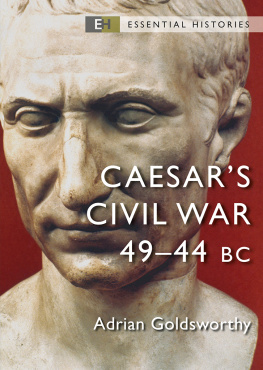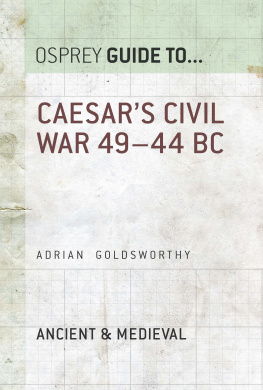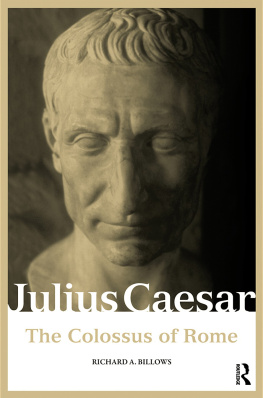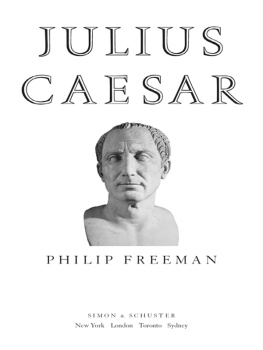
THE CIVIL WAR
ADVISORY EDITOR: BETTY RADICE
GAIUS JULIUS CAESAR was born in 100 B.C. into an ancient patrician family. He was an adolescent during the period of the proscription of Marius (his fathers brother-in-law), die dictatorship of Sulla and the early career of Pompey. His family were traditionally against the patrician senatorial oligarchy and Caesar followed suit. He was imprisoned for a short time by Sulla, but managed to maintain good relations with the nobles for ten years after his release: he was even co-opted into the college of priests (73 B.C.). During die sixties, he advanced through die senatorial cursus to the rank of praetor, while supporting the popular side in politics. In 60 B.C. he formed with Pompey and Crassus the combination known to us as die first triumvirate to overcome conservative senatorial opposition, and he was elected consul for 59 B.C. He was men created governor to Transalpine Gaul, a task which was to occupy him for nine years. He had left die two triumvirs to safeguard his interest in Rome but they had many differences and met him in 56 B.C. in an attempt to solve diem. Pompey was appointed sole consul in 52 B.C. after die death of Crassus, which resulted in civil war and die defeat of the Pompeian faction in Spain (45 B.C.). Caesar came back to Rome as dictator. He tried to improve conditions for the Roman citizen and increase die honesty and efficiency of die government. His dictatorship was declared perpetual in February 44 B.C., but his many bitter enemies hatched a conspiracy and assassinated him in March 44 B.C.
JANE GARDNER was born in 1934, and has degrees in Classics from Glasgow and Oxford Universities. She is a Senior Lecturer in Classics and Curator of die Ure Museum at Reading University. Her publications include die revised edition of S. A. Handfords Caesar: The Conquest of Gaul (Penguin Classics 1982), Women in Roman Law and Society (1986) and (with T. Wiedemann) The Roman Household: A Sourcebook (1991).
CAESAR
THE CIVIL WAR
together with
The Alexandrian War,
The African War,
and The Spanish War
by other Hands
*
TRANSLATED
WITH AN INTRODUCTION
BY
JANE F. GARDNER
PENGUIN BOOKS
PENGUIN BOOKS
Published by the Penguin Group
Penguin Books Ltd, 80 Strand, London WC2R 0RL, England
Penguin Putnam Inc., 375 Hudson Street, New York, New York 10014, USA
Penguin Books Australia Ltd, 250 Camberwell Road, Camberwell, Victoria 3124, Australia
Penguin Books Canada Ltd, 10 Alcorn Avenue, Toronto, Ontario, Canada M4V 3B2
Penguin Books India (P) Ltd, 11 Community Centre, Panchsheel Park, New Delhi 110 017, India
Penguin Books (NZ) Ltd, Cnr Rosedale and Airborne Roads, Albany, Auckland, New Zealand
Penguin Books (South Africa) (Pty) Ltd, 24 Sturdee Avenue, Rosebank 2196, South Africa
Penguin Books Ltd, Registered Offices: 80 Strand, London WC2R 0RL, England
www.penguin.com
This translation first published 1967
Translation, Introduction and Notes copyright Jane F. Mitchell, 1967
All rights reserved
Except in the United States of America, this book is sold subject to the condition that it shall not, by way of trade or otherwise, be lent, re-sold, hired out, or otherwise circulated without the publishers prior consent in any form of binding or cover other than that in which it is published and without a similar condition including this condition being imposed on the subsequent purchaser
9780141910635
GEORGE MORRISON
OPTIMO MAGISTRUM
D.D.
DISCIPULA QUONDAM
INTRODUCTION
Historical background
CAESARS Civil War starts when the point of no return has been reached. The narrative of the Civil War itself, however, is only the penultimate chapter of a story which ends with the defeat of Mark Antony by Octavian in 31 B.C., but which started at least a century before. One must therefore go back and trace the developments which led to the great upheavals which finally put an end to the Republic in all but name.
The careers of the brothers Tiberius and Gaius Gracchus and the military innovations of Marius fundamentally changed the character of Roman politics. The Gracchi set the pattern for their successors by showing that the sovereign power of the people could be used to break the Senates de facto control of government. Their fates showed that civil power was not enough; the senators were prepared to resort to physical force, if necessary, in defence of their monopoly. This made it certain that, if a successful assault on their entrenched power was ever made, it would not come from a mere tribune. It came in fact from men who, while using Gracchan methods, took care also to secure military command, and with it, wealth, patronage and not least important armed power.
The effects were already visible by the time of Gaius Julius Caesars entry into politics. He was born in 100 B.C. (according to tradition), the year of the second tribunate of Saturninus. His father was the brother-in-law of Marius. He was a child at the time of the murder of Livius Drusus and the ensuing war with the Italian allies. He was growing through adolescence in the period of the proscriptions of Marius and the dictatorship and proscriptions of Sulla. He had before him an object lesson in extra-constitutional advancement in the early career of Gnaeus Pom-peius Magnus (to whom I shall hereafter refer by the more familiar name, in English, of Pompey').
By the time of Cagsars first magistracy as quaestor in 68 B.C, Pompey had held a series of important military commands. In his early twenties, he commanded troops under Sulla and extorted a triumph from him. Then, without ever having held a magistracy, he was from 77 to 71 B.C. in almost continuous tenure of military command against Lepidus, against Sertorius, against Spartacus and on his return to Rome proceeded immediately to the consulship. At this period, he was using the support of the popular element in the Senate and, as consul, honoured his election promises by legislation restoring the powers of which the tribunes had been deprived by Sulla. The sixties saw two more commands, carrying with them enormous civil and military powers in the provinces of the Roman empire the special command against the pirates, conferred on Pompey in 67 B.C., and that against Mithridates, conferred on him in the following year and retained for some four years for the reorganization of the East. In both cases, the activity of tribunes secured him these appointments. At Rome, there was widespread apprehension as to how the victor would behave when he brought his armies back apprehension that found expression as early as 65 B.C. in the abortive plot which Cicero successfully deluded subsequent generations into calling the first Catilinarian conspiracy'; in fact, it appears to have been an attempt by a group of the conservative aristocracy to ensure by violence, since electoral corruption had failed, that the key magistracies at Rome should be in the hands of Pompeys opponents on the tatters return.
To everyones surprise, Pompey returned in 62 B.C. and promptly disbanded his armies and relapsed into private life. The action was, however, not untypical of him. Pompey was ambitious; he had a constant appetite for prestige and acclaim. He had considerable military and administrative talents; but although the immense authority he had won, thanks to these gifts, more than once put supreme power within his grasp, had he ventured to take it, he would let the opportunity go. The explanation has sometimes been offered that he was by temperament a constitutionalist; but it may be rather that Pompey was aware that it needed more than talent to make a success of the supreme direction of the Roman empire and perhaps also he was conscious that he lacked that touch of genius. Caesar had it, and Octavian had it, and in both it was accompanied by sufficient self-confidence to make them independent of the senatorial








